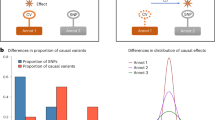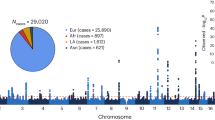Abstract
Purpose: The APC I1307K and E1317Q variants predispose to colorectal adenomas and carcinomas in Caucasians, but data are lacking in Asians.
Methods and Results: We sequenced the APC gene from codons 1261 to 1409 and found none of 147 Chinese, 20 Malay, and 11 Indian colorectal cancer patients in Singapore to carry the APC I1307K or E1317Q variants.
Conclusion: These variants are rare in these Asian populations, and play little role in colorectal cancer causation in Chinese.
Similar content being viewed by others
Main
The APC gene is important in the pathogenesis of both hereditary and sporadic colorectal cancer. Germline mutations are associated with familial adenomatous polyposis, and inactivating somatic mutations between codons 168 and 1680 are important in sporadic colorectal carcinogenesis.1 Low penetrant germline APC variants, including the I1307K and E1317Q variants, predispose to colorectal adenomas and carcinoma.2–6 The APC I1307K variant creates a hypermutable poly-A tract (A8) that increases the chances of adjacent truncating somatic mutations.2 The resultant amino acid change may also have a direct functional effect due to a charge change.7 This variant has been reported exclusively in the Ashkenazi2,7,8 and Yemenite Jewish populations.9 Like the I1307K variant, the E1317Q variant results in a charge difference from a single amino acid change.6 As opposed to the I1307K variant, this variant is present in both Ashkenazi Jewish and non-Ashkenazi Jewish Caucasian populations, and is believed to predispose to colonic adenomas and carcinomas.5,6 It is rare in the general Caucasian population, but is found in 1% to 4% of patients with colorectal cancer or adenomas.5,6
Genetic testing for the APC I1307K and E1317Q variants may identify individuals at high risk for colorectal cancer who may benefit from surveillance or preventive strategies.4 With exception of limited data of the APC I1307K variant in Hawaiian Japanese,8 the influence of neither variant on colorectal adenoma and carcinoma pathogenesis in Asians is unknown.
MATERIALS AND METHODS
We recruited any colorectal cancer patients who were of Chinese, Malay, or Indian origin, from the National University Hospital Cancer Centre, Singapore. Participants provided written informed consent, a three-generation family cancer history, and germline DNA from peripheral blood, and were given the option to be informed of a positive result with genetic counseling as appropriate. Genomic DNA was isolated using the Puregene DNA Isolation kit (Gentra Systems, Inc., Minneapolis, MN). A 449-bp segment of the APC gene encompassing the I1307K and E1317Q variants, from codons 1261 to 1409 was amplified from 300 ng genomic DNA with polymerase chain reaction (PCR). Three DNA samples with the APC I1307K mutation, kindly provided by Dr J.R. Eshleman (Johns Hopkins School of Medicine, Baltimore, MD), served as positive controls. PCR were performed in 50 μL volumes containing 1× PCR buffer (10 mmol/L Tris-HCl, pH 9.0 at 25°C, 50 mmol/L KCl, 0.1% Triton X-100), 0.2mmol/L each of dNTPs, 1.5U Taq DNA polymerase (Qiagen Inc., Valencia, CA), 2 mmol/L MgCl2, 1× Q-Solution (Qiagen), and 0.25 μmol/L each of forward (5′-GACTTATTGTGTAGAAGATAC) and reverse primer (5′-ATGGTTCACTCTGAACGGA). PCR conditions were an initial denaturation at 95°C for 2 minutes, followed by 38 cycles of amplification (95°C for 30 seconds, 51°C for 2 minutes, and 72°C for 2 minutes), and a final extension step at 72°C for 7 minutes. PCR products were visualized by electrophoresis on 1% agarose gel, and purified using the QIA-quick PCR purification kit (Qiagen Inc.). Purified PCR products were sequenced with the PCR forward primer using the BigDye Terminator v3.0 kit (Perkin-Elmer Applied Biosystems, Foster City, CA). Sequencing products were run on the ABI PRISM 3100 Genetic Analyzer (Perkin-Elmer Applied Biosystems), analyzed using the Sequencing Analysis 3.0 software (Perkin-Elmer Applied Biosystems), and compared with the reference sequence (Genbank NM000038).
RESULTS
A total of 178 patients participated. The majority was Chinese, 22% had history of adenomatous polyps, and none had classic familial adenomatous polyposis (Table 1). Thirty-three patients were suspected clinically to have HNPCC because they fulfilled the Amsterdam I/II10 or Bethesda criteria.11 None of the patients carried a germline mutation in the APC gene from codons 1261 to 1409, including specifically the APC I1307K and E1317Q variants.
DISCUSSION
This study represents the first among non-Jewish populations within Asia. Our findings further confirmed the APC I1307K variant to be unique to the Jewish population. Given our large cohort of Chinese patients, we were able to conclude that the APC I1307K and the E1317Q variants are either absent, or present at < 1% prevalence in Singaporean Chinese colorectal cancer patients, and that they play little to no role in the causation of colorectal cancer in Singaporean Chinese. As Singaporean Chinese originate from Southern China, these findings may be extrapolated to the Chinese in mainland China. Although we did not identify these variants in Malays and Indians, we were unable to conclusively exclude their presence in these ethnic populations given our small sample size. The significance of these variants in Malays and Indians can only be ascertained by expanding the study to a larger cohort.
References
Miyoshi Y, Nagase H, Ando H, Horii A, Ichii S, Nakatsuru S, et al. Somatic mutations of the APC gene in colorectal tumors: mutation cluster region in the APC gene. Hum Mol Genet 1992; 1: 229–233.
Laken SJ, Petersen GM, Gruber SB, Oddoux C, Ostrer H, Giardiello FM, et al. Familial colorectal cancer in Ashkenazim due to a hypermutable tract in APC. Nat Genet 1997; 17: 79–83.
Stern HS, Viertelhausen S, Hunter AG, ORourke K, Cappelli M, Perras H, Serfas K, et al. APC I1307K increases risk of transition from polyp to colorectal carcinoma in Ashkenazi Jews. Gastroenterology 2001; 120: 392–400.
Rozen P, Naiman T, Strul H, Taussky P, Karminsky N, Shomrat R, et al. Clinical and screening implications of the I1307K adenomatous polyposis coli gene variant in Israeli Ashkenazi Jews with familial colorectal neoplasia. Evidence for a founder effect. Cancer 2002; 94: 2561–2568.
Lamlum H, Al Tassan N, Jaeger E, Frayling I, Sieber O, Reza FB, et al. Germline APC variants in patients with multiple colorectal adenomas, with evidence for the particular importance of E1317Q. Hum Mol Genet 2000; 9: 2215–2221.
Frayling IM, Beck NE, Ilyas M, Dove-Edwin I, Goodman P, Pack K, et al. The APC variants I1307K and E1317Q are associated with colorectal tumors, but not always with a family history. Proc Natl Acad Sci U S A 1998; 95: 10722–10727.
Evertsson S, Lindblom A, Sun XF . APC I1307K and E1317Q variants are rare or do not occur in Swedish colorectal cancer patients. Eur J Cancer 2001; 37: 499–502.
Prior TW, Chadwick RB, Papp AC, Arcot AN, Isa AM, Pearl DK, et al. The I1307K polymorphism of the APC gene in colorectal cancer. Gastroenterology 1999; 116: 58–63.
Drucker L, Shpilberg O, Neumann A, Shapira J, Stackievicz R, Beyth Y, et al. Adenomatous polyposis coli I1307K mutation in Jewish patients with different ethnicity: prevalence and phenotype. Cancer 2000; 88: 755–760.
Vasen HF, Watson P, Mecklin JP, Lynch HT . New clinical criteria for hereditary nonpolyposis colorectal cancer (HNPCC, Lynch syndrome) proposed by the International Collaborative group on HNPCC. Gastroenterology 1999; 116: 1453–1456.
Umar A, Boland CR, Terdiman JP, Syngal S, de la Chapelle A, Ruschoff J, et al. Revised Bethesda Guidelines for hereditary nonpolyposis colorectal cancer (Lynch syndrome) and microsatellite instability. J Natl Cancer Inst 2004; 96: 261–268.
Acknowledgements
This study is supported by the NUH Molecular Diagnosis Centre grant (EF/2001/07/ROC-007). We thank all participants, May-Chin Yong, A/Prof James R. Eshleman, Johns Hopkins University, and A/Prof Evelyn Koay, Molecular Diagnostics Laboratory, NUH for technical assistance.
Author information
Authors and Affiliations
Rights and permissions
About this article
Cite this article
Guo, J., Lim, R., Soo, R. et al. APC I1307K and the E1317Q variants are not present in Chinese colorectal cancer patients. Genet Med 6, 237–238 (2004). https://doi.org/10.1097/01.GIM.0000132687.93304.C6
Received:
Accepted:
Issue Date:
DOI: https://doi.org/10.1097/01.GIM.0000132687.93304.C6



